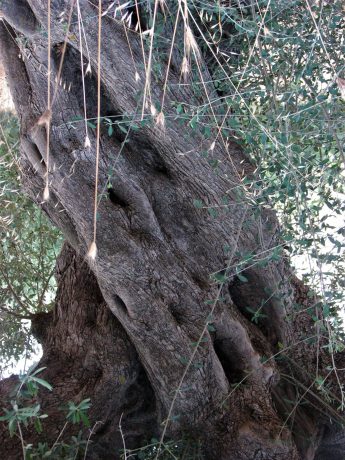It was a hot summer. There was no breeze.
That morning we found the olive trees locals told us about
in their generous dialog. Off the beaten track.
You translated; an ancient grove Plato would have liked.
Then they began exchanging a joke but stopped
upon realizing you were fluent too.
I was glad you spoke the language.
The scent of sage all around, all living things
were praying for rain but these roots run deep.
At sunset we sat in a café on a hill overlooking the harbor
dipped in golden brilliance.
Completely disposed to ourselves.
We talked and sipped wine, ate cucumber slices
dipped in yogurt sauce with a little dill and pinch of salt.
Warm bread sprinkled with olive oil.
Dark Kalamata olives.
All was fresh, intimate, local, as if the custom lived on here.
At night we watched fishing boats swaying in the moonlight.
Things had the shiny edged quality of black and white film
featured in shadow that throws off the light in starbursts.
We relished tender calamari with a dash of lemon
and hint of parsley.
The story as I remember it—the sweetness and timelessness
of our art. Without pseudonym, rediscovered!
How the shape of the dream becomes more distinct—
keeps arriving wheeling constellations to happiness and life.
Unencumbered by torment. Surrounded by summer.
Evolving into poetry.
Stephen Cipot
Garden City Park
Author’s note. This creative work was composed decades ago, revisited during a writing residency in Montauk awarded by the Edward F. Albee foundation, for which I am always grateful.
Running through these works is a general theme of alternating narrative and reflection,
with remarks, asides, notes, a nexus of the inner and outer, picturing a world of meaningful landscapes that we move through and participate in.
A world that is both timebound and not timebound. This works well with poetry and seems necessary.
It’s the kind of epistemological inquires Wittgenstein detailed in the Preface to his “Philosophical Inquires,” where he spoke of the necessity of depicting thought by images and landscapes from different directions making new sketches.
Also spoken to by the philosopher and economist John Maynard Kenes as an attempt at a struggle to escape from the habitual modes of thought and expression having a mechanistic emphasis and determinism.
Here we can include things like politics, economics, medicine, the sciences which I also relish. Probably the worst being the brutal reality of violence and war.
The works are a metaphysical organization and an alternate approach to the world. They also wander, question, beckon and experience. May they offer a little joy and comfort in these troubling times.

